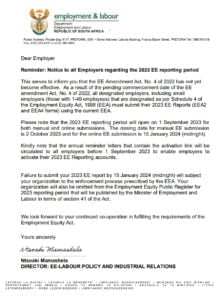EMPLOYMENT EQUITY ACT
EMPLOYMENT EQUITY ACT
The Employment Equity Act (EEA) aims to eliminate unfair discrimination in the workplace by promoting equal opportunities and fair treatment. It applies to all employers, but “designated employers” (who meet the minimum requirements) have additional responsibilities.
EMPLOYMENT EQUITY PACKAGES
The LWO has a dedicated team specialising in the Employment Equity Act. Make sure you know what is expected of you and that you comply with this act. We offer five package options to assist “designated employers” to comply with legislation. Our services include:
- Employment Equity advice (telephonic and per e-mail)
- Free USB with Employment Equity documentation
- Drafting of Employment Equity plan
- Assistance with annual submission of reports
- Assistance with committee meetings
Complete the EMPLOYMENT EQUITY membership application form here.

EMPLOYMENT EQUITY PACKAGES
Although President Cyril Ramaphosa has signed the legislative amendment, the effective date has yet to be proclaimed by the president. The Employment Equity Act, as is currently applicable, is therefore valid and employers must ensure that they comply and meet all existing obligations to avoid fines and/or compliance orders.
Download the Department of Employment and Labour’s notice to employers regarding the 2023 Employment Equity reporting period.
“DESIGNATED EMPLOYERS”
Are you a “designated employer”?
A “designated employer” is any employer with 50 or more employees, OR an annual turnover of:
| Agriculture | R6 million |
| Mining and Quarrying | R22.5 million |
| Manufacturing | R30 million |
| Electricity, Gas and Water | R30 million |
| Construction | R15 million |
| Retail, Motor trade and Repair services | R45 million |
| Wholesale trade, Commercial agents and Allied trades | R75 million |
| Catering, Accommodation and other Trade | R15 million |
| Transport, Storage and Communications | R30 million |
| Finance and Business services | R30 million |
| Community, Special and Personal services | R15 million |
Take note: Should a “designated employer” fail to comply with legislation, the fine for the first offence is R1.5 million or 2% of the employer’s annual turnover (whichever is the greatest). For repeat offenders it is R2.7 million or 10% of the employer’s annual turnover (whichever is the greatest).
What is expected of a “designated employer”?
“Designated employers” have additional obligations and must take care to ensure the following is in place:
1.Appoint a Senior Employment Equity Manager to develop, monitor and implement the Employment Equity Plan (see step 7 below).
2.Collect information – each employee must complete the EEA1 form confirming the employee’s race, gender, nationality and any disabilities where applicable.
3.Create employment equity awareness with regards to all employees.
4.Establish an Employment Equity Committee to hold regular consultations with regards to compliance with the EEA.
5.Hold regular (at least quarterly) consultations to discuss the conducting of an analysis, development of a plan and submitting of the reports to the Department of Employment and Labour.
6. Draft an analysis (EEA12) which must include the following:
- Policies and procedures to address the under-representation of designated groups and a lack of diversity in the workplace
- Practices and factors to promote employment equity
- Under-representation of designated groups and occupational levels
7.Draft an Employment Equity plan (EEA13) which must state the following:
- Objectives for each year (the plan is valid between one to five years)
- Affirmative action measures
- Numerical goals for achieving equitable representation
- A timetable for each year
- Internal monitoring and evaluation procedures, including internal dispute resolution mechanisms
- Identified persons to monitor and implement the plan
8.Submit Employment Equity reports (EEA2 and EEA4) annually on progress made with regards to the implementation of the plan.
IS YOUR BUSINESS LABOUR-COMPLIANT?
FIND OUT NOW.